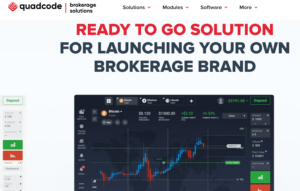Deutsche Bank Chief Risk Officer plays down £41 trillion derivatives exposure – Is bank looking for an exit from electronic markets?
“The risks in our derivatives book are massively overestimated. The €46 trillion (£41 trillion) figure sounds gigantic, but it is completely misleading. The real risk is far lower” – Stuart Lewis, Deutsche Bank’s Chief Risk Officer

A liquidity contraction at Tier 1 bank level could well ensue as Deutsche Bank’s fiscal woes become not only the subject of their mainstream banking division and Germany’s finance minister Wolfgang Schaeuble who brushed the matter under the carpet in a statement earlier this year in which he considered the company’s precarious position to be nothing to worry about, but now the counterparty risk issue has set in within the bank’s derivatives division.
Deutsche Bank was the second largest interbank FX dealer in the world with 14.54% of global market share in 2014 however this reduced to 7.4% by 2015, conducting its liquidity provision from its London operations.
Stuart Lewis, Deutsche Bank’s Chief Risk Officer was questioned about its derivatives exposure, his response having been to play down the estimates that have been made.
“The risks in our derivatives book are massively overestimated. The €46 trillion (£41 trillion) figure sounds gigantic, but it is completely misleading. The real risk is far lower,” he said.
Mr. Lewis spoke to German newspaper Welt am Sonntag (World on Sunday) yesterday stating that the €46 trillion relates to the notional value of derivative contracts rather than the real exposure to the bank, which he maintains is closer to €41 trillion.
This prompted another “nothing to see here” approach from Germany’s finance minister Wolfgang Schaeuble who said “There is far too much talk about Deutsche Bank”.
Indeed there is, Mr. Schaeuble. It is an ailing institution which is a major factor in Tier 1 liquidity worldwide, and as of last week, Germany’s government stated that there would be no state support for the firm if it becomes insolvent, thus this is an important matter, and not one that should be swept under the carpet by using non-transparent government soundbites that have become commonplace in the socialist European parliaments.
A series of plummeting share price episodes once again emerged last week, and as the week drew to a close, an even more precarious position has been demonstrated in that Germany’s government has stated that it would not be prepared to provide any form of state funded bail out for the bank should it eventually hit the buffers.
The consolidation aspect may well be brought in, but, quite rightly, if a buyer comes along, it will buy the derivatives element of Deutsche Bank’s business, and not anything else.
In the United States, which is where the acquisition may come from, just five banks account For 96% of $250 trillion in outstanding US derivative exposure.
The top 4 banks: JPMorgan with $78.1 trillion in exposure, Citi with $56 trillion, Bank of America with $53 trillion and Goldman with $48 trillion, account for 94.4% of total exposure.
Speculation within the interbank sector recently has highlighted that Citi, the world’s largest FX dealer with 16.1% of global market share by volume, may be interested in acquiring Deutsche Bank’s derivatives.
The question is, why would Citi buy more derivatives when last year Citi purchased $250 billion from Deutsche Bank?
Certainly, Citi’s actions, if proceeded with, are perhaps questionable from a longer-term perspective. Most banks are trying to downsize. For instance, Credit Suisse recently sold $380 billion of derivatives to Citigroup, which emphasizes the peculiar rationale as Citigroup nearly completely blew its entire operations in 2008 by over exposing itself to derivatives during the financial crisis.
The US government had to guarantee up to $300 billion or more to ensure that Citi stayed solvent and now, given all the derivatives that Citi is buying, the US government might have to step in again if the market rises, therefore any purchase of Deutsche Bank’s derivative exposure could end up being a transfer of taxpayer funded failure from one jurisdiction to another.
Deutsche Bank’s litany of regulatory fines for malpractices in specific core areas has not enamored the government either, the most recent example being a $14 billion fine from the US Department of Justice for mis-selling mortgage backed securities. LIBOR and FX benchmark manipulation has also cost the bank gravely.
Now, despite the German government’s lack of will to prop up Deutsche Bank, a further difficulty has emerged, that being that it has now become somewhat apparent that Germany could not provide emergency capital to the bank even if it wanted to, meaning that any lobbyists from important financial markets regions such as London would find it difficult to put pressure on the German government in order to maintain Deutsche Bank’s prominent position in the electronic trading world.
The Frankfurter Allgemeine stated that if Chancellor Angela Merkel were to offer state assistance to Deutsche Bank, it would not sit comfortably with the hard line stance she took against a not dissimilar rescue package proposed for Italy’s impoverished banks during the summer of this year.









